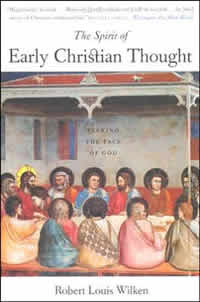Book Notes
 Robert Louis Wilken, The Spirit of Early Christian Thought; Seeking the Face of God (New Haven: Yale, 2003), 368pp.
Robert Louis Wilken, The Spirit of Early Christian Thought; Seeking the Face of God (New Haven: Yale, 2003), 368pp.
In a previous volume called The Christians as the Romans Saw Them (1984), Robert Louis Wilken, professor of the History of Christianity at the University of Virginia, explored the broad and deep antipathy that developed in the first five centuries toward the Christian movement, at least as that was expressed by the cultured elites. He presented the views of the pagan critics with both sympathy and understanding, devoting one chapter each to the views of Pliny the Younger, the physician Galen, Celsus, the Neoplatonic philosopher Porphyry, and the Roman emperor Julian. In a short epilogue, Wilken acknowledged that Christians responded to their critics: "There was a genuine dialogue, not simply an outpouring of abuse. The credit goes as much to the Christians as to the pagans." In this present volume Wilken explores the emergence of what eventually became a distinctly Christian view of God, the world, the self, and human history.
Although his task requires him to consider the history of theology as it developed in the early church, and its relationship with thinkers of Judaism, Greece and Rome, Wilken warns us not to be be overly preoccupied with intellectual ideas. The Gospel, after all, does not intend to make us smart, but to transform our hearts, minds, and our very lives. Early Christianity appealed to history, reason, ritual, experience, and most of all to the Scriptures, all with the goal of authentic faith expressing itself in true love. What we seek is not barren knowledge but the very face of God (see Psalm 105:4). In his panoramic survey Wilken describes how we know God in worship, the sacraments and the Scriptures; the struggles to define the Trinity, the nature of Christ, and creation; the relationship of faith to reason and the church to broader society; poetry and icons; and then the nature of Christian virtue and the spiritual life. From start to finish the book is a feast of the early Christian fathers, with special emphasis on Origen, Gregory of Nyssa, Augustine, and Maximus the Confessor. These forbears are, as he says in the last sentence of the book, "still our teachers today."


